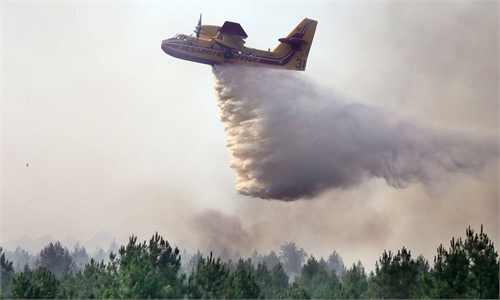
A sign reads the temperature at 102 degrees Fahrenheit in San Antonio, Texas, the United States, on July 18, 2022. More than 100 million people are currently under heat related warnings and advisories across the United States, the National Weather Service (NWS) Weather Prediction Center said. Photo: Xinhua
A group of Chinese scientists, whose work was based on the latest analysis, found that extreme heatwave events will increase to 32 percent of the days in North America by the end of the century, and similar events in regions including Asia and Europe will show similar trends.
The findings, published on Friday in the journal Advances in Atmospheric Sciences, said greenhouse gases are the main reason for the long-term increase of the surface air temperatures in western North America during the past and into the future, and the chances of extreme events in western North America will increase from 1.2 percent to 32 percent under future Shared Socioeconomic Pathways scenarios during 2021-2100.
Most of the probable increase will be the result of greenhouse gases, according to the study.
So far this summer, scorching heatwaves in Europe have claimed at least 1,500 lives, according to ABC News. But the extreme heatwaves have not only taken place this year. In 2021, a late June heatwave in the US and Canada also saw temperatures that broke records by several degrees, including a new all-time Canadian temperature record of 49.6 C.
Wang Chunzai, leading author and researcher in the Southern Marine Science and Engineering Guangdong Laboratory and head of the State Key Laboratory of Tropical Oceanography at the South China Sea Institute of Oceanology of the Chinese Academy of Sciences, told the Global Times on Friday that the lab found that the evolution of the heatwave in western North America during late June 2021 was related to anomalous circulations in the North Pacific and Arctic.
"In this paper, we studied the physical processes of internal variability, such as atmospheric circulation patterns, and external forces, such as anthropogenic greenhouse gases," Wang said.
Wang's team, using the internationally curated, tested and assessed models from the World Climate Research Program, found that it is likely that global warming associated with greenhouse gases influences atmospheric circulation pattern variabilities, which, in turn, led to a more extreme heatwave event.
"If appropriate measures are not taken, the occurrence probability of extreme heatwaves will increase and further impact the ecological balance, as well as sustainable social and economic development," Wang said.
The latest analysis of atmospheric circulation patterns and human-caused emissions that led to the 2021 heatwave in North America may also explain Europe's current heatwave, he said.
The heatwave events in regions like Asia and Europe have similar trends as those in western North America, although the magnitudes of increase of the heatwave events in different regions are slightly different. But one thing is for sure - extreme heatwave events in most parts of the world will increase significantly in the coming years, if appropriate measures are not taken, Wang said.
Wang said that it doesn't matter where the greenhouse gases are produced, as once they are released into the air, they can affect heatwave events all over the world. He noted a collaborative effort is needed to reduce the extreme events related to greenhouse gases.


